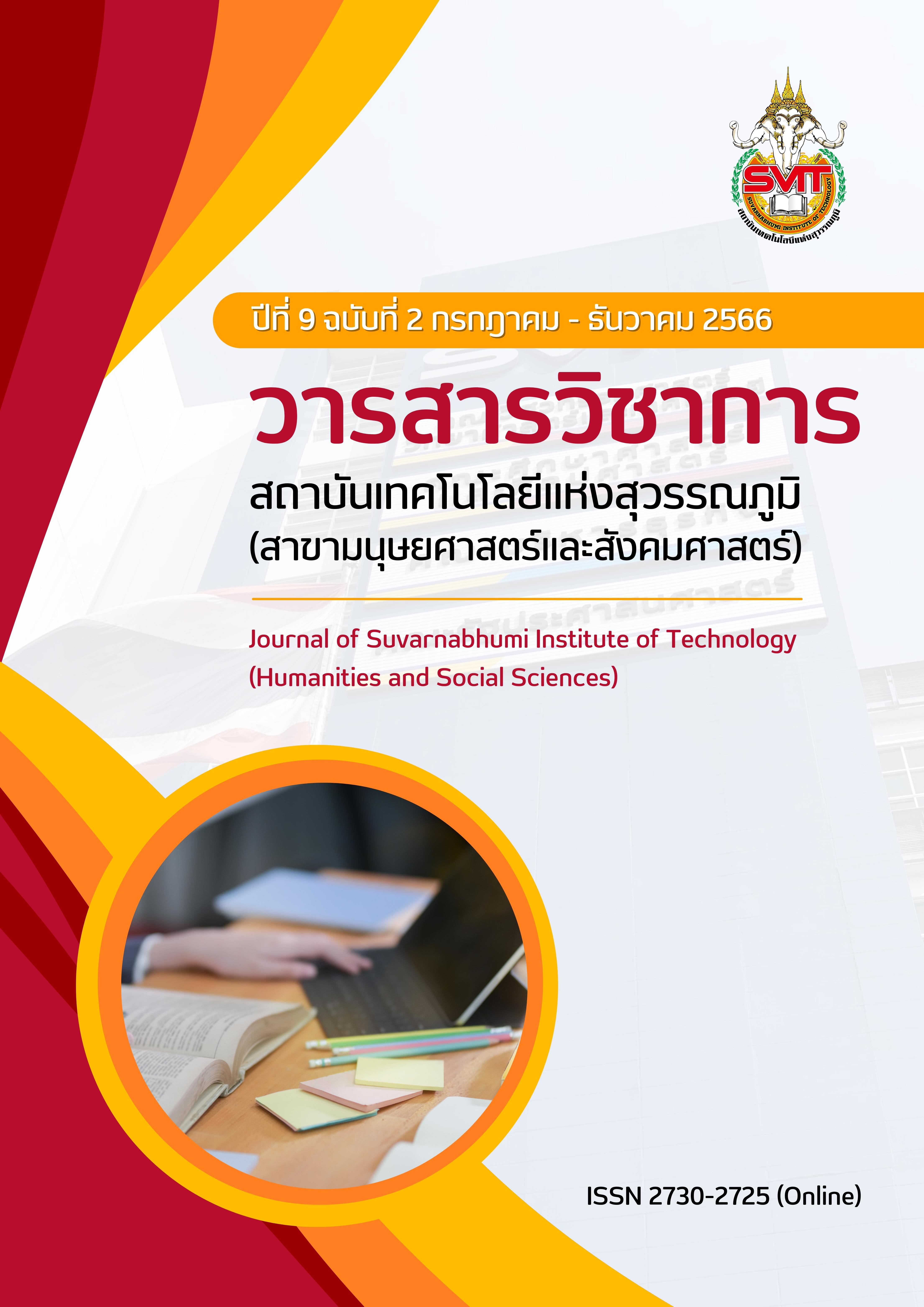FACTORS INFLUENCING THE DECISION OF USING DIGITAL CURRENCIES
Keywords:
Unified Theory of Acceptance and Use of Technology, Trust, Social InfluencesAbstract
The objectives of this research were to: study the factors of trust, social influences, efficiency expectation, effort expectancy, facility conditions, marketing value, and the decision to use digital currencies. The data were gathered through an online Google form with 400 samples derived by convenient sampling techniques from people who have had experience in using digital currencies. The data were analyzed through percentage, mean, SD, and multiple regression analysis.
The results revealed that the factors of trust, social influences, efficiency expectation, effort expectancy, facility conditions, and marketing value had effects on the decision to use digital currencies with the statistical significance of correlation coefficient value at a high level (R=0.953). The forecasting value was 90.8% with the standard error of the forecasting factor at 0.30755 (SEE 0.30755). The factors with the highest influence on the decision to use digital currencies were the facility conditions followed by efficiency expectation effort expectancy trust marketing value and social influences with regression coefficients of 0.329, 0.158, 0.156, 0.123, 0.119, and 0.114, respectively.
References
เกียรติกร เทียนธรรมชาติ. (2558) อิทธิพลต่อการตัดสินใจยอมรับใช้เงินดิจิทัล (บิทคอยน์) ของผู้บริโภคกลุ่มMillennials ในกรุงเทพมหานคร (การค้นคว้าอิสระปริญญามหาบัณฑิต, มหาวิทยาลัยธรรมศาสตร์).
กรวินท์ เขมะพันธุ์มนัส และ กนกวรรณ ไทยประดิษฐ. (2563) ปัจจัยที่ส่งผลต่อการยอมรับร้านอาหารออนไลน์ของผู้สูงอายุในจังหวัดตรัง. วารสารเทคโนโลยีภาคใต้, 13(2), 32-42.
กัลยา วานิชย์บัญชา. (2556) การวิเคราะห์ความถดถอยและสหสัมพันธ์เชิงซ้อน การวิเคราะห์สถิติ: สถิติสำหรับการบริหารและวิจัย (พิมพ์ครั้งที่ 14) กรุงเทพฯ: โรงพิมพ์แห่งจุฬาลงกรณ์มหาวิทยาลัย.
การเงินธนาคาร. (2564) บาทดิจิทัลมาแล้ว เริ่มใช้ไตรมาส 2 ปีหน้า. วารสารการเงินธนาคาร, ตุลาคม 2564 ฉบับที่ 474
จิรายุทธ์ ธราธรรุ่งเรื่อง และ พัฒน์ พัฒนรังสรรค์. (2563) ปัจจัยที่ส่งผลต่อการตัดสินใจใช้สกุลเงินดิจิทัลของธนาคารแห่งประเทศไทย (วิทยานิพนธ์ปริญญามหาบัณฑิต, มหาวิทยาลัยเกษตรศาสตร์ วิทยาเขตศรีราชา).
ชรินทร์ เขียวรัตนา. (2563) ปัจจัยการยอมรับเทคโนโลยีที่มีอิทธิพลต่อการตัดสินใจใช้บริการ QR Code ผ่านสมาร์ทโฟน กรณีศึกษา ลูกค้าธนาคารกรุงเทพ จำกัด (มหาชน) ในเขตอำเภอหาดใหญ่จังหวัดสงขลา (วิทยานิพนธ์ปริญญามหาบัณฑิต, มหาวิทยาลัยสงขลานครินทร์).
ปฐวี ฉลวย สิงหะ ฉวีสุข และณัฐพล พันธุวงศ์. (2558) การประยุกต์ใช้ทฤษฎีรวมการยอมรับการใช้เทคโนโลยี (UTAUT) และส่วนขยายทฤษฎีรวมการยอมรับการใช้เทคโนโลยี (UTAUT2) กับการทำธุรกรรมทางอิเล็กทรอนิกส์ (วิทยานิพนธ์ปริญญามหาบัณฑิต, มหาวิทยาลัยพระจอมเกล้าเจ้าคุณทหารลาดกระบัง).
ธนาคารเพื่อการส่งออกและนำเข้าแห่งประเทศไทย. (2565) นโยบาย Cryptocurrency ของต่างประเทศรู้ไว้ให้ทันการเปลี่ยนแปลงในโลกอนาคต สืบค้นจาก https://www.exim.go.th/eximinter/e-news/26418/0222_finance.html.
ธนาคารแห่งประเทศไทย. (2563) Retail CBDC สกุลเงินดิจิทัลธนาคารกลาง กับเศรษฐกิจการเงิน https://www.bot.or.th/Thai/ResearchAndPublications/articles/Pages/Article_19Nov2021.aspx
ธนัญชย์ กาฬเนตร และยุพาวรรณ วรรณวาณิชย์. (2564) โมเดลการยอมรับเทคโนโลยี และความไว้วางใจที่มีผลต่อการใช้บริการ เอสซีบี อีซี่. วารสารวิชาการสถาบันเทคโนโลยีแห่งสุวรรณภูมิ, 7(1), 374-389.
วิริยาภรณ์ เตชะกฤตธีรพงศ์. (2558) ปัจจัยการยอมรับการใช้งานเทคโนโลยีการทำงานร่วมกันของบุคลากรองค์การ (การค้นคว้าอิสระปริญญามหาบัณฑิต, มหาวิทยาลัยธรรมศาสตร์).
วรรณา แซ่ตั๊น. (2560) ปัจจัยที่มีอิทธิพลต่อพฤติกรรมการใช้โมบายแอพบริการรับ-ส่งสินค้าด่วนของผู้บริโภคในกรุงเทพมหานคร (การค้นคว้าอิสระปริญญามหาบัณฑิต, มหาวิทยาลัยกรุงเทพ).
สถาบันวิจัยเศรษฐกิจป๋วย อึ๊งภากรณ์. (2564) สกุลเงินดิจิทัลของธนาคารกลางในระดับรายย่อย: บริบทของไทย สืบค้นจาก https://www.pier.or.th/abridged/2021/11/#top
อลิสา ธีระศักดาพงษ์. (2559). ปัจจัยที่ส่งผลต่อการเลือกใช้งาน Bitcoin. (การศึกษาค้นคว้าอิสระปริญญามหาบัณฑิต, มหาวิทยาลัยธรรมศาสตร์).
อานนท์ หย่องฮวย และ อานนท์ ทับเที่ยง. (2562). ปัจจัยที่มีผลต่อการยอมรับการเชื่อมโยงข้อมูลระหว่างหน่วยงานภาครัฐและภาคธุรกิจ. วารสาร Engineering Transactions, 22(1), 41-47.
Chan, F. T. S., Alain, Y. L. C., & Li, Z. (2012). An empirical investigation of factors affecting e-collaboration diffusion In SMEs. International Journal of Production Economics, 138(2), 329-344.
Guo, H., Huang, X., & Craig, P. (2015). Factors Influencing the User Acceptance of Alipay. In International Conference on Economy, Management and Education Technology (ICEMET 2015), 344-347. Dordrecht, The Netherlands: Atlantis Press
Khalil, O. E. M., & Nasrallah, A. a. A. (2014). The adoption of the traffic violation e-payment system (TVEPS) of Kuwait. Electronic Journal of Knowledge Management, 12(1), 3-22.
Kuttimani,T., Nripendra, P.R., & Yogesh,D. K. (2018). Use of ‘Habit’ Is not a Habit in Understanding Individual Technology Adoption: A Review of UTAUT2 Based Empirical Studies. In International Working Conference on Transfer and Diffusion of IT (TDIT), Jun 2018, 277-294, United Kingdom: Portsmouth.
Ooi, K. B., & Tan, G. W-H. (2016). Mobile technology acceptance model: An investigation using mobile users to explore smartphone credit cards. Journal of Expert Systems with Applications, 59, 33-46.
Silic, M., & Back, A. (2013). Organizational Culture Impact on Acceptance and Use of Unified Communications & Collaboration Technology in Organizations. BLED 2013 Proceedings, 28. Retrieved from https://aisel.aisnet.org/bled2013/28
Venkatesh, V., L. Thong, J. Y., & Xu, X. (2012). Consumer acceptance and use of information technology extending the unified theory of acceptance and use of technology. MIS Quarterly, 36(1), 157-178.
Yamane, T. (1967). Statistics, An Introductory Analysis. (2nd Ed.) New York: Harper and Row.
Downloads
Published
Issue
Section
License
Copyright (c) 2023 Suvarnabhumi Institute of Technology

This work is licensed under a Creative Commons Attribution-NonCommercial-NoDerivatives 4.0 International License.
The articles published are copyrighted by the Sarasas Journal of Humanities and Social Science. The opinions expressed in each article in this academic journal are those of the individual authors and do not reflect the views of Sarasas Suvarnabhumi Institute of Technology. The authors are solely responsible for all aspects of their respective articles. Any errors or inaccuracies in the articles are the sole responsibility of the authors.



